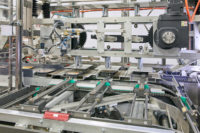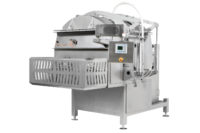Versatility In Action
By Barbara Young,
Editor-In-Chief
Editor-In-Chief
Cargill’s Springdale, AR, facility promotes the potential of turkey by manufacturing a wide variety of products
Although roast turkey is to holiday meals what hotdogs and hamburgers are to baseball season fare, there is much more product potential in turkey meat than whole birds offer.
To be sure, a single turkey is capable of yielding a variety of products including boneless and bone-in breast meat, burgers, and a variety of sausages. Thus, virtually every part of the turkey is usable to produce some form of value-added products.
“We are trying to grow the per-capita consumption of turkey as an industry,” emphasizes John O’Carroll, president, Wichita, KS-based Cargill Value Added Meats, including the turkey division. “Sales were flat for a number of years, but that is changing with the increase in value-added products, especially ground turkey.”
The turkey division — a business unit of Cargill Meat Solutions (CMS), a business grouping within Minneapolis-based Cargill Incorporated — operates processing facilities in Springdale, AR; California, MO; Waco, TX; and in Virginia at Dayton and Timberville. A distribution center operates in Mt. Crawford, VA.
Several locations have reached significant work-safety milestones of no lost-time accidents. The Springdale turkey complex has amassed 10 million man-hours with no lost work time accidents. The Arkansas record, established by a non-meat-industry business, stands at 11.4 million man-hours.
“We’d like to beat that record,” Paul Lawrence, assistant vice president and general manager, asserts.
The feedmill in Dayton, VA, institutionalized its safety record by qualifying for OSHA’s Voluntary Protection Program (VPP) status last year. It became one of 1,006 sites nationwide to receive OSHA’s “Star” status, designed to recognize worksites with exemplary health and safety programs that exceed the administration’s minimum regulatory requirements.
“This demonstrates that our employees place safety at the top of their minds and that our processes are recognized to be among the best,” Patrick Evick, feedmill manager, says. “We continually work on our safety programs to not only protect our employees but also the surrounding community.”
Jesus Villarreal understands that the turkey business mission is to create distinctive value for its customers.
But he also knows that distinctive value goes beyond innovation and customer focus.
“It also means doing the job safely,” says Villarreal, who supervises the chub pack room at the Springdale facility.
Like other parts of the meat industry, turkey processing includes a number of repetitive motion tasks, which CMS addresses through ergonomics and automation to relieve stress on workers.
The box-making process, for example, is automated, with two machine operators replacing four people who used to build boxes by hand.
“We eliminate repetitive tasks by investing in automated equipment,” says Heath Ward, operations manager at Springdale.
To emphasize its focus on worker safety, Springdale is also applying for VPP status under OSHA.
“Once we qualify, it won’t change how we operate daily,” Lawrence says. “VPP status is prestigious in our labor-intensive environment. It will be an endorsement of things we work on daily to treat people right and send them home the same way came to work.”
Distinctive value through innovation
The Arkansas facility processes more than 13 million live male and female turkeys annually on a 24-hour, seven-day-a-week work schedule.
The plant is designed to produce products with year-round consumer appeal. Based on the rate of growth on the product development front evidenced by 300 different product codes and a planned 80,000-square-foot expansion, the plant is on track.
Products include fresh and frozen whole birds; fresh and frozen bone-in breasts; chops, strips, and roasts from breast meat; turkey burgers; and sausages for breakfast and dinner including bratwurst and Italian.
“Every day we work at getting those quality products out in a timely fashion,” notes David Fryar, operations manager in the debone department. “And it has to be done in a safe fashion.”
Quality procedures from farm to plant
Along with worker safety, food safety is a major focus of the CMS turkey business. “We are aggressively attacking bacteria like Salmonella on the farm and in the plant,” explains Fryar.
CMS worked with animal health experts at the University of Arkansas for help in developing an ingredient that is added to water and is capable of reducing Salmonella in birds pre-harvest.
To assure that birds come to the plant healthy, they arrive no more than five hours prior to harvest. Trucks return to farms cleaned and washed.
Sanitation procedures define the cleanliness of plant environments. The Springdale plant uses an independent sanitation and cleaning company for the job.
“A clean plant is a must,” asserts Rick Allred, operations manager in Springdale. “And housekeeping is crucial and not just for food safety. A piece of skin or fat on the floor makes it very slippery. So good housekeeping affects worker safety as well as food safety.”
Before the chilling process, a trisodium-phosphate rinse is applied pre-chill to harvested turkey. “This is one of the industry’s most effective weapons,” says Fryar. “It is a direct result of our food-safety initiative.”
Other CMS food-safety measures include the following:
Birds complete the chill process at 40°F or less to reduce pathogens.
Broth-making systems are equipped with a UV system to reduce bacteria.
Chlorine dioxide systems installed in chillers support pathogen control measures.
Separation between the slaughter phase and further-processing lines avoids cross contamination pitfalls.
Foot and hand sanitizers exist throughout all facilities.
Having been in poultry production and processing since the 1960s, Cargill is well versed in animal health issues, including Avian influenza. The highly pathogenic strain (H5N1) strain has devastated flocks in Asia and has begun to spread into Europe.
“We take this issue seriously,” says O’Carroll says. “The health of our birds is essential to our success. Biosecurity clearly is the answer.” NP



Report Abusive Comment